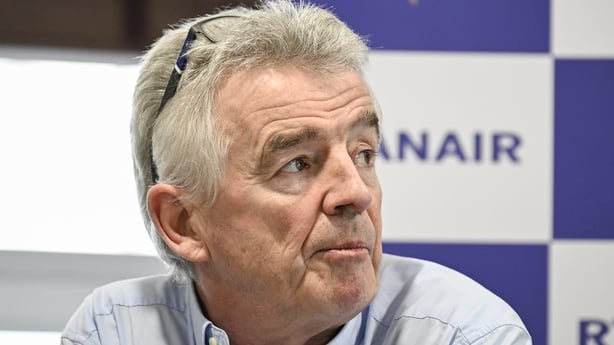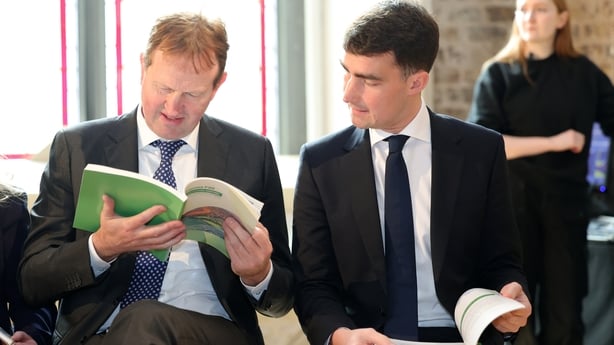When it comes to political gaffes, there is no such thing - unlike airlines - as a low-cost version.
This is a lesson that Fine Gael has learned in the school of hard knocks, as a controversy over respect for teachers has hung over the crucial opening days of this campaign.
After 13 years in government, it is no wonder the party is prone to blunders - as often happens when the trappings of power instils complacency.
The controversy over the apparent slagging off of teachers, by the Ryanair boss Michael O'Leary at a Fine Gael campaign launch, has come with a high cost.
Not just because it has put Fine Gael on the defensive as the campaign gets into gear, but more so because it blew up at the most opportune time for Fianna Fáil as it launched its election manifesto.
These manifesto launches are arguably the most crucial of set pieces for any political party in an election campaign.
They are not just about policy priorities, they are an opportunity for parties to grab the limelight and set the overall tone they want to strike with the electorate.
And so it was no surprise that Fianna Fáil’s deputy leader Jack Chambers, opening the Fianna Fáil launch in Dublin’s Smock Alley Theatre, stressed that his party was rooted in community and "that is why you won’t see Fianna Fáil hosting events where public servants are undermined or laughed at".
He was having a dig, in case you missed it, at the Ryanair boss’s comments at the campaign launch for Fine Gael’s Peter Burke, in which he said: "The Dáil is full of teachers. Nothing wrong with teachers, but I wouldn’t generally employ a lot of teachers to go out and get things done."

It was not the comments themselves, rather the hilarity they drew from the Fine Gael faithful who had gathered at the event, that drew criticism from political opponents.
All the ingenuity of O’Leary’s marketing department could not have come up with a better backdrop for Fianna Fáil as it launched what it called its "plan for moving Ireland forward together" with a timely emphasis on education, community and justice.
More importantly for Fianna Fáil, it gave the answer to what has been a strategic dilemma for them going into this campaign: How do they differentiate themselves from Fine Gael without criticising the shared record in coalition?
When he got to his feet, Micheál Martin said it would never have happened at a Fianna Fáil event.
He spoke about education being a "core part of the Fianna Fáil identity" and spoke of how the party understood it as an "essential foundation stone" for the country’s economic and social development.
"In my home we were told to get your education, we’ll get you to second level and third level - and Fianna Fáil made that possible."
He said the comments about teachers "illustrates certain characteristics of the party’s (Fine Gael’s) orientation and "speaks to fundamental differences between the ethos" of both parties.
This was the sharpest dig yet at his coalition partners, and the point at which the gloves came off.
Read more: Latest General Election 2024 news
The Fianna Fáil manifesto is almost 200 pages long and, as is always the case with such documents, the precise detail is less important than the handful of easy to access, eye-catching policy pledges which the party can sweat for the remainder of the campaign.
In this case they are: a weekly pension of €350, a €12 per year increase to core welfare rates and bringing childcare down to €200 a month - or possibly more.
Fianna Fáil seeks the upper hand on Fine Gael when it comes to wooing renters.
The manifesto promises to double the renter’s tax credit, which would bring it from €1,000 to €2,000 per annum, as opposed to Fine Gael who would increase it to €1,500.

However the manifesto does not contain a rent freeze, which it said would be "counter-productive to the objective of having more homes available in the rental market."
On other housing measures, Fianna Fáil proposes to ramp up building to 60,000 homes a year by 2030, including 10,000 affordable homes and 12,000 social homes a year.
Fianna Fáil also focuses on the cost of living - a key concern for voters in this campaign - although apart from welfare increases and help with childcare, there is little in the way of concrete promises that can be made here.
Again it tries to distinguish itself from Fine Gael by stressing that it would not do anything that could result in VAT being increased on energy bills, which would be kept at 9%.
Fine Gael has proposed cutting VAT for the hospitality sector in the first 100 days of office, but that would compromise the ability to have a 9% rate for energy bills, because the EU limits the amount of reduced VAT rates.
Fianna Fáil also makes promises on taxation, to lure middle income workers.
This includes increasing the entry point for the higher rate of income tax to €50,000 and cutting the lower rate of USC from 3% to 1.5%.
Another policy that might grab some attention is to introduce a tax credit for gym membership.
But Fine Gael was quick to show that it could school Fianna Fáil on the economy.
These pledges are simply "back of the matchbox" stuff that would "set Ireland backwards and scupper the economic progress we have made in recent years," according to Fine Gael’s Helen McEntee.
Fianna Fáil hit back saying all costings were provided by the Department of Finance and - in the first Taylor Swift reference of this campaign - Fine Gael "need to calm down".
They are the only party, they have pointed out, that has published a full manifesto "that sets out proposals" rather than the "soundbites that Fine Gael and Sinn Féin are focused on".
This points to another benefit of this manifesto for Fianna Fáil - and that is being first out of the traps in publishing it, stealing a march on Fine Gael in the early part of the campaign.
Will it make a difference? Less than half of manifesto promises typically make it to real life policy.
But they are important in the tone they set and the quotable policies that can be drawn from it.
And they matter less in an era of fragmented politics, where multi-parties are needed to form a government.
On the subject of what he once termed "coalitionology", Mr Martin said he believes "we are looking at another three-party coalition government" after this election.
On who his party would do business with, he said its "core positions" are that budgets must be progressive, there must be a pro-European dimension to any government he is party of, and that they have to be in favour of the economic model of the past 50 years, that favours enterprise and foreign direct investment.
That is a fairly broad set of criteria and means that whatever about the manifesto promises, Fianna Fáil is more than willing to compromise on its positions to get back into government, if the seat numbers permit.
With unexpected turbulence instigated by the Ryanair boss, Fianna Fáil and Fine Gael have taken themselves by surprise in just how hard they have gone for each other, just four short days into the election campaign.






